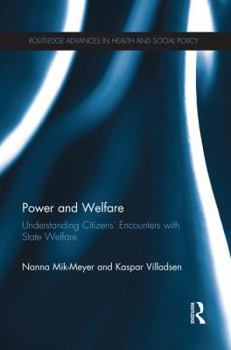Power and Welfare: Understanding Citizens' Encounters with State Welfare
Select Format
Select Condition 
Book Overview
In the welfare provision of today, power takes both the shape of juridical sanctions and of attractive offers for self-development. When state institutions punish criminals, remove children at risk, or enforce sanctions upon welfare recipients the question of power is immediately urgent. It is less readily evident that power is at stake when institutions educate, counsel or 'empower' citizens. This book offers a framework for understanding and...
Format:Paperback
Language:English
ISBN:1138817848
ISBN13:9781138817845
Release Date:August 2014
Publisher:Routledge
Length:176 Pages
Weight:0.52 lbs.
Dimensions:0.6" x 5.9" x 8.9"
Customer Reviews
0 rating





